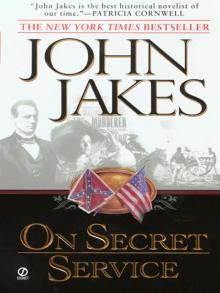- Home
- John Jakes
Lawless Page 23
Lawless Read online
Page 23
Tinderbox.
Chicago was that, all right.
In more ways than one.
Chapter IV
Julia at Home
i
NILS ERICSSON ARRIVED at eight the next morning. He was a big, heavy-shouldered Scandinavian with fifteen years’ experience on various midwest railroads, and an almost messianic belief in the need for organization. It turned out that he, too, paid his own way to the annual meetings of the National Labor Union, though he and Gideon had never chanced to meet at one of those affairs. Ericsson said he liked to absorb the essentials of the N.L.U. gospel—expansion of the eight-hour day from the Federal sector into the private one; formation of a Federal labor department; elimination of abuses in the child labor system—and then repeat them to any Chicago workingman’s group which would have him as a free speaker.
He and Gideon left the hotel and found a restaurant nearby. They ordered breakfast. Only then did Gideon mention Florian’s threat. Ericsson didn’t take it lightly. But neither was he cowed by it.
“Matter of fact, I’m a bit encouraged, Mr. Kent.”
Gideon sipped his coffee. “How so?”
“Well,” the other man said in his accented voice, “Florian’s visit means Tom Courtleigh is really fretting that we may get enough men together to start a strong brotherhood and force the W and P to meet our demands.”
“They got wind of the meeting, though,” Gideon reminded him. “It’s obvious you have at least one turncoat in your crowd.”
Ericsson shrugged. “I got used to scabs and cowards a long time ago. But if you’re agreeable, I won’t inform any of the fellows about Mr. Florian’s call. I want as many as possible to show up at my house.” The big man took a moment to use a wooden toothpick from the little china jar in the center of the table. “How’d Sid Florian strike you?”
“I wasn’t overly impressed.”
“Don’t let his scarecrow looks fool you. He’s done plenty of strikebreaking around this part of the country. Used to be employed by Pinkerton’s. Courtleigh hired him away. Pays him a small fortune, I hear. When it comes to bringing grief to the laboring man, there’s damn little Tom Courtleigh won’t do. Yes, sir—Florian trained under the master. If he or some of his hirelings should visit us tomorrow night, we could have a royal scrap on our hands.”
Again he didn’t sound wholly unhappy; in fact, Gideon detected a combative glint in Ericsson’s eye. That was a point on which they differed, then. The war had shown Gideon that violence was not something jolly and sporting, but a grim, gritty business which always had sad consequences for someone. Sometimes violence was necessary; a man couldn’t permit himself to be walked on. But that did not mean violence was enjoyable or even desirable.
He thought it wise to remind Ericsson about one specific part of Florian’s threat. “There was a mention of families being harmed. Your wife, for instance.”
Ericsson sobered and shook his head. “That’s a grand demonstration of how much the line knows and cares about its employees. I’m a widower, Kent. I lost my wife, Helga, four years ago.”
“I’m sorry.”
“I do have my spinster sister to look after. She helps me out around the house.”
“Does she live close by?”
“Yes, Sigrid has a flat on Sebor Street. That’s just a few blocks from my place.”
“Your letters mentioned a son, as I recall—”
With obvious pride, Ericsson said, “His name’s Torvald. He wants to stay for the meeting. I’m going to permit it. He’s old enough. Now let me draw you a little map showing you how to reach Taylor Street. It’s across the south branch of the river. Not hard to find.”
Soon they left the restaurant, Gideon having taken care of the bill. Ericsson glanced at the brass-bright sky. “By damn. Still no sign of rain. It’s been a bad summer, Kent. The town’s bone dry.”
“So I’ve heard.”
Abruptly, Ericsson remembered something: “Ah, but I meant to ask whether you’re busy this evening. My sister will be cooking supper at my house. Sigrid and I would be pleased to have you join us.”
Gideon smiled. “Very kind of you. But I’ve already made plans to pay a social call.”
“Oh, you have old friends in Chicago?”
“An acquaintance,” he replied with a thoughtful expression. “Just an acquaintance.”
ii
Shortly before six that evening, Gideon donned a fresh shirt and cravat and walked to the Palmer House. He stepped up to the first hack in the taxi rank and asked the driver whether by chance he knew the State Street address of a suffragist named Julia Sedgwick. He was startled at the vehemence of the reaction.
“The Lucy Stoner who runs around the country spoutin’ heathen nonsense about women bein’ equal to men? I surely do know her address—been in the Trib lots of times. She lives down at State and Twenty-first. The swank neighborhood.”
His glance said he thought the last place Gideon would have business was a swank neighborhood. But he asked, “You want to go there?”
“Yes. I’ll walk. Thanks for the information.”
The cabby was irate. “Looking for some of that free love them godless women practice, are you? She won’t fool with your sort, you damn cheapskate!”
Laughing, Gideon walked south beneath the gaslights glowing in the dusk. His pace grew brisk; his footsteps rapped on the wide plank sidewalks that, together with the softly shining lights, made State Street so up to date and attractive.
His smile faded when he thought of the emotional language the cab driver had used in connection with Julia. All in all, the suffragist cause was almost as badly tarred as the labor movement.
The cabby had called her a Lucy Stoner. The leader of Julia’s association had refused to adopt her husband’s name when she got married, and many women who followed her did likewise.
He had spat out the word heathen. Most of the country’s conservative clergymen opposed the women’s movement. The Bible specifically said a wife was required to be submissive and obedient to her husband in all things. This was reflected in the property and divorce laws in effect in most states. It also followed that, given woman’s biblically ordained position of inferiority, any attempt to change that position and expand her rights was an affront to God’s natural order.
The cabby had also accused Julia of free love; in mixed company the term free association was preferred, since it spared the sensitive. Some members of the movement did boast that they not only condoned but practiced free love. Inevitably, the sins of a few—plus a good many imaginary transgressions—were attributed to any woman crusading for equal rights. It was all wearily familiar to Gideon. Déjà vu, wasn’t that the French expression?
Soon he began to feel a touch of anxiety. There was no guarantee Julia would be home—or that she’d receive him if she were. Yet he didn’t turn back.
Below Sixteenth, the houses grew more imposing, occupying half-block lots and then, after he’d passed Eighteenth, the full block. At a gabled mansion between Nineteenth and Twentieth, a large party was in progress. The place blazed with light, and he heard a string orchestra, and much laughter. Out in front coachmen were tossing dice while they waited for their employers. The men observed Gideon with amusement; he was clearly out of place in this district.
He crossed Twentieth and drew in a sharp breath at the sight of Julia’s house. It was a huge, three-story stone structure with a mansard roof and identical front-corner towers. Most of the lower windows along the front were illuminated, so perhaps she was home.
But she also had company. A hired carriage bearing the nameplate of the Parmelee Livery stood in the drive. Again Gideon drew a scornful look from the carriageman. He glared until the driver looked away, then marched up the steps, wiping sweat off his forehead with a kerchief.
He rang the bell. A butler answered, scrutinized him and started to shut the door.
“Tradesmen or those seeking employment are to go to the rear entrance.�
��
Gideon shoved his knee against the door. The butler cried, “See here, sir!”
“My name’s Kent,” Gideon exclaimed. “I’m—” He hesitated. Did you address a divorced Lucy Stoner as Miss or Mrs.? “I’m Julia’s relative by her former marriage.”
The waxy-faced servant sniffed and stepped back. “Your name again, please?”
Annoyed, he said, “Gideon Kent.”
“She is expecting you?”
“No. I just arrived in Chicago and found myself with a few moments—” He started as the butler shot out his white-gloved hand.
“Your visiting card.”
“I don’t have any visiting cards, you stuck-up jackass!”
The butler went white. Gideon shoved the elaborately carved door all the way open and stalked into a breathtaking foyer, where the crystal pendants of an enormous gas chandelier scattered brilliant little lights on the walls, furnishings and marble floor. He pivoted and barked at the butler as if he were addressing a recruit, “You march to cousin Julia and tell her Gideon Kent’s in the hall. Or I’ll give you what Jeb Stuart’s cavalry used to give you Yankees—” He shot out his fist as if it held a sabre and yelled, “Hah!”
The butler literally jumped a foot. Gideon laughed. The other man hurried out, mumbling, “She—they—you—may be required to wait—Cooke—representative—is with—”
Pop-eyed, he disappeared into what appeared to be a library. Could he have been referring to the banking house of Jay Cooke, whose brother ran the railroad lobby and who’d personally spearheaded the drive to sell Federal war bonds, becoming a kind of financial hero of the North?
If so, Louis’ former wife was traveling in the highest economic circles. Jay Cooke ran a solid and respected bank, and he was the moving force behind the most spectacular railroad promotion of the postwar period—the sale of a hundred million dollars’ worth of bonds to finance a second transcontinental line.
The Northern Pacific was to be built along the Canadian border. To move the bonds, Cooke’s had even dispatched agents to Europe to set up sales offices in the palaces of the nobility. The war between France and Prussia had undone many of those deals, however. So the banking house had redoubled its efforts at home, had even hired a professional publicist to write about the lush land through which the railroad would run. The publicist’s rhapsodies had gotten out of hand, though, and now there were jokes about Jay Cooke’s Banana Belt, where orange groves and banana plantations would one day rise from the Dakota flat-lands. Still, Gideon knew thousands of small investors trusted both the Cooke firm and the future of railroads, and were putting all their savings into Northern Pacific bonds.
He began to inspect the opulent foyer more closely. Everything about it including its sweeping marble staircase spoke of vast wealth. Julia hadn’t taken a penny of Louis Kent’s money, that much he knew. She was obviously even richer than he’d thought.
Again he recalled his father speaking of Julia’s selfish and willful nature. What had changed her into a fighter on the barricades of social revolution? He couldn’t imagine.
He did know a bit about the current state of the women’s movement. Earlier in the year, a schism had split it into two groups. One was the so-called Boston group led by Lucy Stone and Julia Ward Howe, the group for which Julia traveled and lectured. Its proper name was the American Woman Suffrage Association. The other group, the National Association, still operated out of New York under the direction of Susan B. Anthony and Elizabeth Cady Stanton.
The split had come about because the leaders of the movement had wanted to start a woman’s newspaper to be called The Revolution. A sponsor and underwriter was needed, and an eager one happened to be handy—the wealthy and eccentric George Francis Train. Mr. Train dabbled in causes. In fact he dabbled so widely and so uncritically, he’d earned the nickname “the champion crackpot.”
Mr. Train had stopped in Paris during the last days of the Commune. He was en route from Britain, where he’d done a jail term for espousing Irish independence, to Japan, where he proposed to sample the pleasures of mixed bathing in the nude. He loved traveling, and wherever he went, he promoted the unbelievable idea that, thanks to modern steam transportation, a man could circle the globe in eighty days or even less. So far no one had.
In Paris, Train enthusiastically endorsed the Commune—a position of which the Versailles troops sternly disapproved. When they closed in on Train at his hotel, he fled to the balcony, draped himself in American and French flags presumably obtained for the occasion, and shrieked at the soldiers to fire if they dared. They hadn’t dared, and so Train had returned to the States, where he rushed to the defense of Victoria Claflin Woodhull. Victoria and her sister, Tennessee Claflin, were two of the more flamboyant members of the suffrage movement. Woodhull & Claflin’s Weekly, which they edited, spoke out for free love—which Victoria cheerfully admitted practicing. When this caused her to be charged with obscenity, Train took up the cudgels so vigorously, he was arrested for obscenity too.
Lucy Stone wanted no financing from anyone that disreputable. Susan Anthony and Elizabeth Stanton were willing to take the needed money almost anywhere they found it. An argument ensued; the ranks were sundered.
The scuff of a shoe brought Gideon’s head around. From a rear hallway, a boy of about nine had appeared, holding a toy locomotive in swarthy hands. For a moment Gideon experienced the eerie sensation of gazing at Louis Kent reborn.
But there were differences, as he recalled from the previous occasion on which he’d met the boy. Julia’s son was a handsome youngster with dark hair, olive skin and intense dark eyes. His mouth was less petulant than his father’s and his demeanor was vigorous and cheerful rather than arrogant.
Gideon strode forward and extended his hand. “Hello, Carter. You don’t remember me.”
Carter Kent’s gaze lingered on the eye patch. “I believe I should, but—”
“It was Boston, after your father passed away. I’m his second cousin once removed—”
“That’s right! Gideon Kent.”
“Good for you.” They clasped hands.
“Of course I remember now,” Carter said with enthusiasm. “You’re from the Virginia side of the family. You sang all those cavalry songs for me.”
“Exactly.” Gideon smiled. “‘Jine the Cavalry’ and the rest. I’m happy to see you looking so well.”
“Gideon Kent?” said a lilting female voice. He turned and his mouth dropped open, and for a moment he was totally unable to utter a word.
iii
Julia Sedgwick was almost as he remembered her: two or three years older than Gideon, tiny, no more than five feet, but beautifully proportioned with well-rounded hips and small, high breasts. What caused him to be so astonished was her costume. She wore pale green slippers and a robe de chambre of emerald silk with collar and cuffs trimmed in white fur.
As she walked forward to greet him, the robe grew taut over her hip. He saw a hint of a whaleboned corset. The throat of the gown was discreetly tied, and the sleeves reached to her wrist. But he could only think of the costume as “advanced.” Although it was undoubtedly cooler than a regular dress, proper women simply did not greet callers in attire designed for the bedchamber.
Julia’s son probably didn’t realize his mother was being unconventional, Gideon thought. From the glow in Carter’s dark eyes, it was obvious that he’d have worshiped her if she’d been clothed in rags. Still, Gideon could understand why Julia was something of a celebrity among hack drivers at the city’s best hotel—and why one particular driver had classed her with society’s withered rose petals, as prostitutes were called in sensational newspapers which dared mention them at all.
Julia glided up to him, glossy dark hair trailing around her shoulders. He sniffed and got another shock. The stubby cylinder trailing smoke from her left hand was a cheroot!
“Gideon, what a happy surprise!” She shook his hand, man fashion.
“Yes—yes—” Somehow her
appearance made him tongue-tied. It didn’t help to remind himself that suffragists often preferred avant-garde fashions such as Mrs. Bloomer’s trouser outfit. It didn’t help at all; he felt like he’d wandered into a bordello.
She noticed his discomfort. “Oh dear! I am sorry if the robe puts you off. Poor Mr. Robbins who handles my account with Cooke and Company almost fainted when he first saw it. But I just despise being uncomfortable around home. And life’s too short to spend it fretting about outdated conventions.” She put her arm around her son and hugged him with obvious affection. “As long as the only man in my life thinks I’m respectable, what do I care about the rest?”
Carter gazed at her fondly. Julia squeezed him once more, then walked back to her guest.
“I’m delighted to see you. I’ve been home four days and won’t be going on another lecture tour for a week. Carter and I get very little company. Have you had dinner?”
“No, but I only planned a brief courtesy call—”
“Nonsense!” Though lightly spoken, the word carried an undertone of insistence. She was accustomed to having her way—with audiences and everyone else, he suspected. “Neither have we. You must join us. Carter—”
“What, Mother?”
“Please run to cook and tell her we’ll be wanting something good in about an hour.”
With a look at the tall, tawny-haired man who was beginning to recover his composure, the boy asked, “Three of us?”
Julia didn’t even bother to glance Gideon’s way. There was nothing overtly haughty about that, just a calm unspoken certainty that no one would deny her wants once she’d expressed them. A strong woman, Gideon thought. A mite too strong, perhaps. Yet he found himself fascinated.
“Yes,” she said, giving Gideon another warm smile. “Three of us.”

 The Bastard
The Bastard The Furies
The Furies The Bold Frontier
The Bold Frontier The Americans
The Americans Mention My Name in Atlantis
Mention My Name in Atlantis California Gold
California Gold North and South
North and South Savannah, or a Gift for Mr. Lincoln
Savannah, or a Gift for Mr. Lincoln Heaven and Hell
Heaven and Hell Homeland
Homeland On Secret Service
On Secret Service The Lawless
The Lawless The Titans
The Titans The Seekers
The Seekers Love and War
Love and War North and South: The North and South Trilogy (Book One)
North and South: The North and South Trilogy (Book One) North and South Trilogy
North and South Trilogy Love and War: The North and South Trilogy
Love and War: The North and South Trilogy North and South: The North and South Trilogy
North and South: The North and South Trilogy Savannah
Savannah Lawless
Lawless Conquest Of The Planet Of The Apes
Conquest Of The Planet Of The Apes Love and War: The North and South Trilogy (Book Two)
Love and War: The North and South Trilogy (Book Two) The Rebels: The Kent Family Chronicles
The Rebels: The Kent Family Chronicles Heaven and Hell: The North and South Trilogy
Heaven and Hell: The North and South Trilogy Planet of the Apes Omnibus 2
Planet of the Apes Omnibus 2 The Bastard: The Kent Family Chronicles
The Bastard: The Kent Family Chronicles Heaven and Hell: The North and South Trilogy (Book Three)
Heaven and Hell: The North and South Trilogy (Book Three)